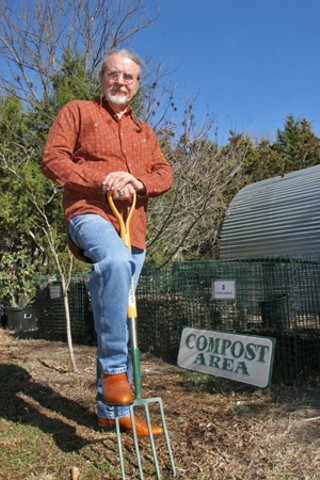The Dirt on Composting
By Daniel Mottola, Fri., Jan. 18, 2008

Compost happens. It's nature's way of sustaining herself nutritionally, sending all manner or life to take apart and recycle decaying organic matter, a symbiosis that allows insects, worms, and microorganisms to feed while transforming everything from leaves to lemon peels into rich soil that minimizes the need for chemical fertilizers and watering. But the way we commonly dispose of much of our organic waste – by bagging it in plastic and burying it in tomblike landfills – makes it very hard for nature to do her thing. According to a Texas A&M report, 20-50% of waste sent to landfills is made up of organic matter like kitchen scraps, tree leaves, grass clippings, and other landscape debris. We pay for it directly, through our garbage-collection bills, and indirectly when tax dollars are devoted to the often odious task of finding new landfills or keeping old ones in operation – as with the twin Northeast Austin dumps operated by Waste Management Inc. and BFI, loathed by neighbors for odors and litter yet currently seeking expansion permits. Landfills are also the largest source of human-produced methane, a greenhouse gas more than 20 times more effective at trapping heat than carbon dioxide.
There are plenty of ways to compost at home, with or without access to a yard. (Check out some examples at www.ci.austin.tx.us/sws/compostbin.htm.) The payoff, aside from doing your part to reduce waste, is really good fertilizing soil. Compost is considered a soil amendment – nature's own nutrient-rich, slow-release fertilizer. Common compostables – in addition to yard debris like grass, leaves, and twigs – include kitchen waste such as veggie scraps, egg shells, coffee grounds and filters, old bread, and fruit, as well as shredded newspaper, junk mail, and soiled paper towels, as long as they're free of chemicals. Even pet hair and floor sweepings can be composted. Composting rejects include nonbiodegradable plastics and metals, meats and bone (which attract rodents), and pet droppings (which can contain dangerous bacteria).
Local organic gardening authority and Natural Gardener founder John Dromgoole calls compost "earth's healing tool" and "the basis for the organic technique." He recounts composting's manifold benefits, including diminishing the greenhouse effect, allowing soil to retain more moisture and to become more drought tolerant, replenishing nitrogen without petrochemical fertilizers, and slowing the growth of landfills. A compost pile can be constructed for less than $15, he says, and if kept at the proper moisture level, it will never have an odor. The pile should be kept as moist as a wrung-out sponge. Too much water will restrict air penetration, making the pile's chemistry anaerobic, and thus odorous and ineffective. Turn the pile as needed to keep it aerated or to speed up the process. Dromgoole recommends collecting leaves now to keep beside the pile year round to cover up new additions, as well as rinsing out recyclables over the top of the pile to incorporate moisture and the residuals from inside the containers.
Jessica Wilson, project coordinator for nonprofit Keep Austin Beautiful and head of the group's Compost Critters program, teaches composting to local grade-schoolers. The kids get hands-on experience in vermicomposting: the use of worms called red wigglers (similar to night crawlers) to do the grunt work of composting indoors. Vermicomposting, or vermiculture, is an ideal option for apartment dwellers; Wilson recommends an online tutorial at www.wormmainea.com/Worm_Bin_Instructions.pdf. Wilson estimates that a pound or two of worms in a 20- to 25-gallon container can handle the composting needs of a three- to five-member family.
A handful of cities (Seattle, San Francisco, and Los Angeles) are beginning to accept household compostables along with yard debris, collected curbside. Since 1989, Austin has picked up yard debris curbside each week; it is shredded and mixed with "biosolids," or treated sewage sludge, then cured, sifted, and sold locally as Dillo Dirt. Asked recently about allowing Austinites to include their kitchen scraps along with yard debris, representatives of the city's Solid Waste Services Department said they aren't considering the practice; they do wholeheartedly encourage backyard composting. Other cities do more; Seattle, for example, provides residents with a large bin in which they can combine household compostables and yard debris. San Francisco accepts both of those, in addition to meat and bones.
Texas Disposal Systems operates a regional landfill south of Austin in Creedmoor and currently accepts 100% of Austin's residential garbage. TDS is also one of the largest commercial composters in the state, preventing approximately 142,000 tons of organic matter from being landfilled per year – more than all of Austin's 120,000 tons of annual residential trash, according to TDS President Bob Gregory. Among the items TDS composts, processes with shredded brush, and sells commercially: off-spec Coca-Cola products, Whole Foods' spoiled produce, roadkill, milk fat, and clean Sheetrock and untreated wood from construction sites. Gregory commends Austin's yard-debris collection program but says, "The city could divert more waste from the TDS landfill." He recommends the city broaden curbside compost collection or offer drop-off centers.
Waste expert Neil Seldman, president of D.C.-based nonprofit Institute for Local Self-Reliance, said composting can save up to 18% per year per household on trash hauling and disposal costs. "If everyone did these small steps collectively," said Dromgoole, "it would have one of the biggest impacts. You don't necessarily have to join a big environmental organization to save the planet."
Got something to say on the subject? Send a letter to the editor.








